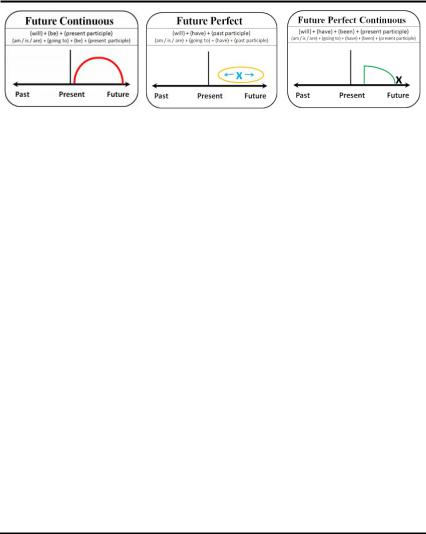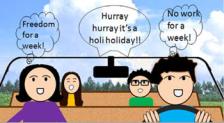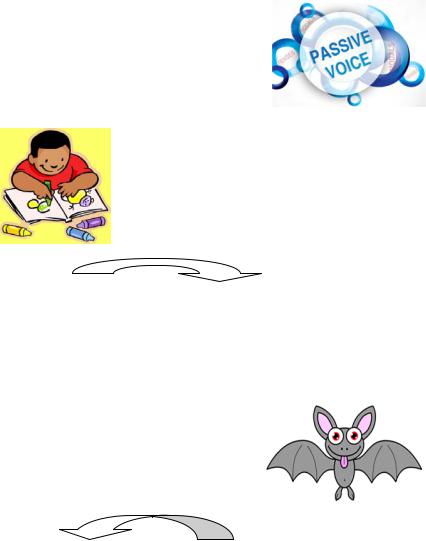
English Grammar in Context
.pdf
Future Continuous / Future Perfect / Future Perfect Continuous
These people are standing in queue to get into the cinema.
Half an hour from now the cinema will be full. Everybody will be watching a film.
An hour from now the cinema will be still full. Everybody will have been watching a film for half an hour.
Three hours from now the cinema will be empty. The film will have finished. Everybody has gone home.
31

(+) |
|
|
|
|
(+) |
|
|
|
I / we / they / he / she / |
I / we / they / he / she / |
|||||||
it will be doing. |
|
|
it will have done. |
|
||||
(?) |
|
|
|
|
(?) |
|
|
|
Will I / we / they / he / |
Will I / we / they / he / |
|||||||
she / it be doing? |
|
she / it have done? |
|
|||||
(–) |
|
|
|
|
(–) |
|
|
|
I / we / they / he / she / |
I / we / they / he / she / |
|||||||
it won’t be doing. |
|
it won’t have done. |
|
|||||
|
|
|
||||||
1. Specific time in the |
1. Completed |
Action |
||||||
future |
|
|
|
before Something |
in |
|||
At |
midnight |
tonight, |
the Future |
|
|
|||
we will still be driving |
By next November, |
|||||||
through the desert. |
|
I will have |
received |
|||||
2. Parallel Actions |
in |
my promotion. |
|
|
||||
the Future |
|
|
|
2. Duration |
before |
|||
Tonight, they |
will |
be |
Something |
in |
the |
|||
Future |
(Non- |
|||||||
eating |
|
dinner, |
||||||
discussing their |
plans, |
Continuous Verbs) |
|
|||||
and |
having |
a |
good |
I will have been in |
||||
time. |
|
|
|
London for six months |
||||
|
|
|
|
|
by the time I leave. |
|
||
|
|
|
|
|
|
|
|
|
(+)
I / we / they / he / she / it will have been doing.
(?)
Will I / we / they / he / she / it have been doing?
(–)
I / we / they / he / she / it won’t have been doing.
1. Duration |
before |
Something |
in the |
Future |
|
They will have been talking for over an hour by the time Thomas arrives.
No Future in Time Clauses
Like all future forms, the Simple Future cannot be used in clauses beginning with time expressions such as: when, while, before, after, by the time, as soon as, if, unless, etc. Instead of Simple Future, Simple Present is used.
Example: When you arrive tonight, we will go out for dinner.
32
Let’s practice
1.Complete the sentences using will ('ll) or going to.
1.A: Why are you turning on the television?
B:I'm going to watch the news. (I/watch)
2.A: Oh, I've just realised. I haven't got any money.
B:Haven't you? Well, don't worry. ____________ you some. (I/lend)
3.A: I've got a headache.
B:Have you? Wait there and I ___________ an aspirin for you. (I/get)
4.A: Why are you filling that bucket with water?
B:____________ the car. (I/wash)
5.A: I've decided to repaint this room.
B:Oh, have you? What colour _____________ it? (you/paint)
6.A: Where are you going? Are you going shopping?
B:Yes, ____________ something for dinner. (I/buy)
2.Read the situations and complete the sentences using will ('ll) or going to.
1.The phone rings and you answer. Somebody wants to speak to Jim. CALLER: Hello. Can I speak to Jim, please?
YOU: Just a moment. ____________ him. (I/get)
2.It's a nice day. You've decided to sit in the garden. Before going outside, you tell your friend.
YOU: The weather's too nice to stay indoors. ____________ in the garden. (I/sit)
FRIEND: That's a good idea. I think ___________ you. (I/join)
3.Your friend is worried because she has lost an important letter.
YOU: Don't worry about the letter. I'm sure __________ it. (you/find) FRIEND: I hope so.
4.There was a job advertised in the paper recently. At first you were interested but then you decided not to apply.
FRIEND: Have you decided what to do about that job that was advertised?
YOU: Yes, ______________ for it. (I/not/apply)
5.You and a friend come home very late. Other people in the house are asleep. Your friend is noisy.
YOU: Shhh! Don't make so much noise. _______________ everybody up. (you/wake)
6.John has to go to the airport to catch a plane tomorrow morning. JOHN: Ann, I need somebody to take me to the airport tomorrow
morning.
ANN: That's no problem. ________________ you. (I/take) What time is your flight?
33

JOHN: 10.50.
ANN: OK. ________________ at about 9 o'clock then. (we/leave) Later that day, Joe offers to take John to the airport.
JOE: John, do you want me to take you to the airport? JOHN: No thanks, Joe. _______________ me. (Ann/take)
3. Holiday Plans. Ask and answer questions about travel plans
Example:
Student A: Are you going to go alone?
Student B: No, I think I’ll go with friends.
Use the prompts to ask and answer questions:
go with friends? book a hotel? |
go alone |
|
go with my parents |
book a hotel? |
take a tent |
|
find a hotel when I arrive |
travel by plane? |
take a credit card |
|
change my money when I get there |
go to the beach? |
travel by train |
|
hire a car |
take a suitcase? |
go sightseeing |
|
stay at the swimming pool |
take a guidebook? |
take a backpack |
|
take a bag |
stay by the beach? |
go trekking |
|
travel around the countryside |
send me a postcard? |
phone you |
|
write you an email |
come back soon? |
travel for a year |
|
come back in two weeks |
34

4. Read the dialogues and complete the sentences with Future Simple or Future Perfect.
Margaret: Do you think everything will be finished when I get back from the store?
Jerry: Don't worry. By the time you get back, I (pick) ____________ up the living room and (finish) _____________ washing the dishes. Everything will be perfect when your parents arrive.
Margaret: I hope so. They (arrive)
_________ round 6 o'clock.
Jerry: Everything (be) __________
spotless by the time they get here.
Jane: I can't believe how late we are! By the time we get to the dinner, everyone (finish, already) _________ eating.
Jack: It's your own fault. You took way too long in the bathroom.
Jane: I couldn't get my hair to look right. Jack: Who cares? By the time we get
there, everyone (left) _____________. Nobody (see, even) ____________ your hair.
5. Future Perfect or Future Perfect Continuous.
1.By the time we get to Chicago this evening, we (drive) ___________
more than four hundred miles. We are going to be exhausted.
2.When Sarah goes on vacation next month, she (study) ____________
German for over two years. She should be able to communicate fairly well while she is in Austria.
3.I have not traveled much yet; however, I (visit) __________ the Grand Canyon and San Francisco by the time I leave the United States.
4.By the time you finish studying the verb tense tutorial, you (master)
_______________ all twelve tenses including their passive forms.
5.Drive faster! If you don't hurry up, she (have) __________________
the baby by the time we get to the hospital.
6.I came to England six months ago. I started my economics course three months ago. When I return to Australia, I (study) ____________ for nine months and I (be) _________ in England for exactly one year.
35
6. Future Simple or Present Simple.
1.I’ll call you when I ________ (arrive) at my hotel.
2.He ________ (text) you as soon as he’s on the bus.
3.Let’s eat dinner when John ________ (get) here.
4.Julie ________ (be) late tomorrow evening, so I’ve booked a table at a restaurant for 10 pm.
5.As soon as I ________ (be) able to, I’m going to get a new job.
6.Please wait here until the nurse ________ (call) you.
36

U n i t 6
PASSIVE VOICE (1)
PASSIVE VS ACTIVE,
PASSIVE IN VARIOUS TENSES,
PREPOSITIONS USED
IN PASSIVE
Active form:
Joseph draws pictures.
Subject |
Verb |
Object |
|
|
|
Joseph |
draws |
pictures |
The focus is on the subject (the doer) who performs the action expressed in the verb.
Passive form:
The picture was drawn by Joseph.
Object |
Verb |
Subject |
|
(becomes subject) |
(becomes object or is dropped) |
||
|
|||
|
|
|
|
The picture |
was drawn |
by Joseph |
|
|
|
|
The focus is not on the subject, but on the action or the object which was acted upon.
37

Form of the Passive:
Subject + to be in the tense of the active verb + Past Participle
When using active sentences in Passive voice, note the following:
•The object of the active sentence becomes the subject of the passive sentence.
•The form of the verb is the appropriate form of to be (the tense of the active voice main verb) + the Past Participle.
•The subject of the active sentence becomes the object of the passive sentence (or is dropped.)
Passive vs Active voice in different tenses:
|
|
Tense |
|
Subject |
Verb |
|
Object |
||||||
|
|
|
|
|
|
|
|
|
|
|
|
|
|
|
Simple |
|
|
Active: |
|
Mary |
makes |
|
|
tea |
|||
|
Present |
|
|
Passive: |
|
Tea |
is made |
|
by Mary |
||||
|
|
|
|
|
|
||||||||
|
Present |
|
|
Active: |
|
Mary |
is making |
|
|
tea |
|||
|
continuous |
|
|
Passive: |
|
Tea |
is being |
|
by Mary |
||||
|
|
|
|
|
|
||||||||
|
|
|
|
|
|
|
|
|
made |
|
|
|
|
|
Simple past |
|
|
Active: |
|
Mary |
made |
|
|
tea |
|||
|
|
|
|
Passive: |
|
Tea |
was made |
|
by Mary |
||||
|
Past |
|
|
Active: |
|
Mary |
was making |
|
|
tea |
|||
|
continuous |
|
|
Passive: |
|
Tea |
was being |
|
by Mary |
||||
|
|
|
|
|
|
||||||||
|
|
|
|
|
|
|
|
|
made |
|
|
|
|
|
Present |
|
|
Active: |
|
Mary |
has made |
|
|
tea |
|||
|
perfect |
|
|
Passive: |
|
Tea |
has been |
|
by Mary |
||||
|
|
|
|
|
|
||||||||
|
|
|
|
|
|
|
|
|
made |
|
|
|
|
|
Future |
|
|
Active: |
|
Mary |
will make |
|
|
tea |
|||
|
simple |
|
|
Passive: |
|
Tea |
will be |
|
by Mary |
||||
|
|
|
|
|
|
||||||||
|
|
|
|
|
|
|
|
|
made |
|
|
|
|
|
With |
|
|
Active: |
|
|
Mary |
|
should |
|
|
tea |
|
|
Modals |
|
|
|
|
|
|
|
make |
|
|
|
|
|
|
|
|
Passive: |
|
Tea |
should be |
|
by Mary |
||||
|
|
|
|
|
|
|
|
|
made |
|
|
|
|
38

Passive voice questions:
To form a question, the first auxiliary is placed before the subject.
Affirmative Statement |
Question |
|
|
You were shown the sights. |
Were you shown the sights? |
She is being shown the sights. |
Is she being shown the sights? |
|
|
How to use Passive Voice
The Passive is used:
1. If the action is more important then the agent.
This theatre was built in 1868. (The important thing is what happened, not who did it.)
2.If the agent is not known.
He was offered a job. (Someone offered him the job.)
Sentences which cannot be changed into passive voice:
A verb can be either transitive or intransitive. A transitive verb needs an object (in sentence) to give complete meaning while intransitive verb does need an object (in sentence) to give complete meaning. Intransitive verbs cannot be changed into Passive voice. The reason is that there is not any object in such sentences and without object of sentence Passive voice is not possible.
He sent a letter. (Send is a transitive verb and it needs an object i.e. letter to express full meaning.)
Sleep, arrive, go, come, exist, happen, have, live, occur, reach, sit, die are examples of intransitive verbs.
The following tenses can also not be changed into Passive voice:
•Present perfect continuous tense
•Past perfect continuous tense
•Future continuous tense
•Future perfect continuous tense
39

|
Prepositions used in Passive voice: |
By |
– This book was written by Shakespeare. |
With |
– This letter was written with a pen, not a pencil. |
Of |
– What is this made of? |
In |
– Made in USA. |
|
Let’s Practice |
1. Read the text and put the verbs in brackets into PRESENT SIMPLE PASSIVE.
There is a chimpanzee which …… is called …… (call) “Bubbles”. It …… (own) by Michael Johnson. It ……(keep) in his home. It ……… (feed) every day by Michael Johnson himself. It …… (always / dress) in funny clothes. It … (said) that “Bubbles” is Michael Johnson’s only friend.
2.Put the verbs in brackets into PAST SIMPLE PASSIVE.
Two men ….. were seen ……. (see) breaking into a house in my street last night. The police …… (call) and they arrived very quickly. One man …(catch) immediately. The other escaped, but he …… (find) very soon. Both men
……(take) to the police station where they ………
(question) separately by a police officer. The two men
……(charge) with burglary.
3.Choose the best option.
1.The book was published / published in 2010.
2.My parents will lend / will be lent me some money to buy a new car.
3.It is said / says that some sports involve serious risks.
4.Lots of workers have been made / have made redundant as a result of the crisis.
5.My father was bought / bought me a CD.
4.Using the PASSIVE, ask questions to which the bold type words are answers.
1.Columbus discovered America. …… Who was America discovered by?
2.We keep money in a safe.
3.A bee stung him.
4.They speak Italian in Italy.
5.They have taken his aunt to hospital.
40
